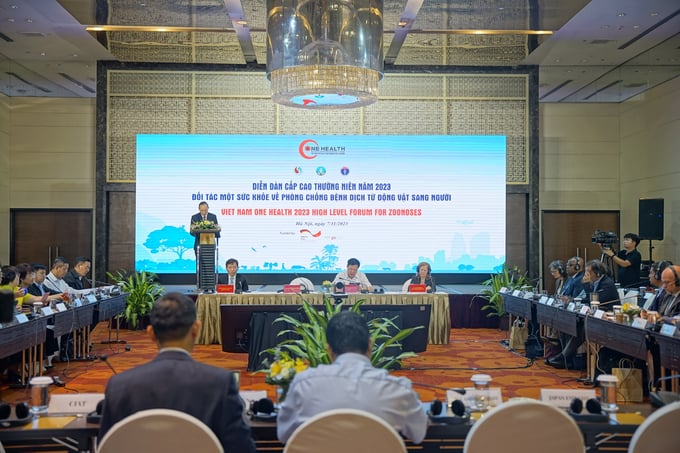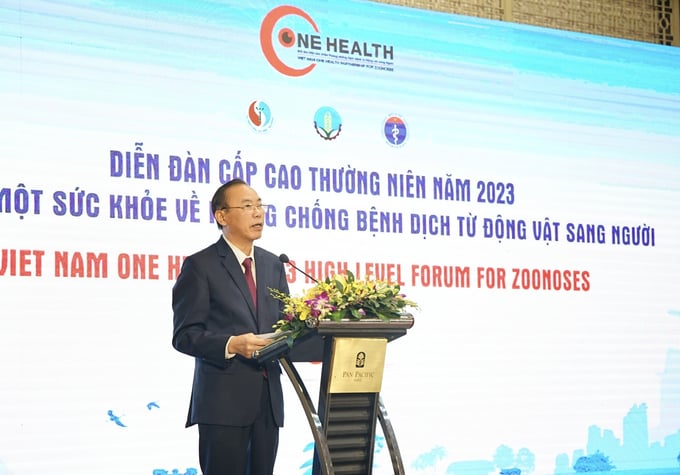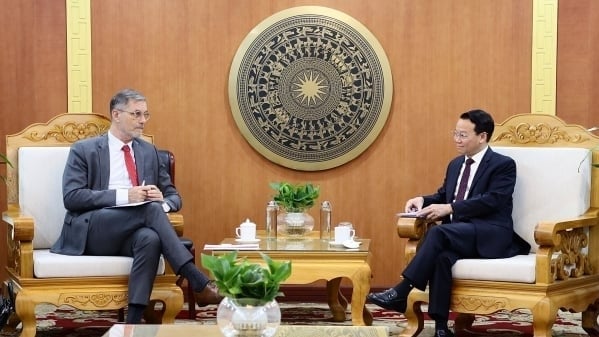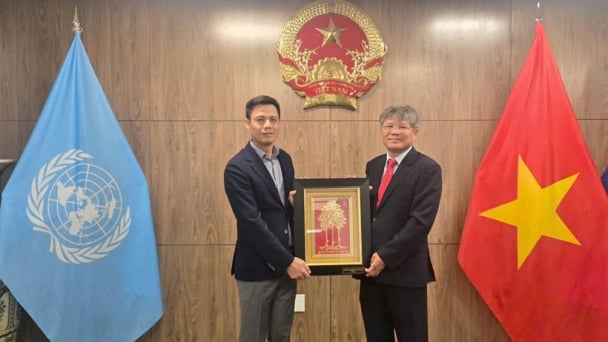May 22, 2025 | 17:57 GMT +7
May 22, 2025 | 17:57 GMT +7
Hotline: 0913.378.918
May 22, 2025 | 17:57 GMT +7
Hotline: 0913.378.918

The Ministry of Agriculture and Rural Development is co-chairing the event with the Ministries of Health, Natural Resources and Environment, and the United States Agency for International Development (USAID). Photo: Linh Linh.
The event was co-chaired by the Ministry of Agriculture and Rural Development, in collaboration with the Ministries of Health, Natural Resources and Environment, and the United States Agency for International Development (USAID).
The forum aims to summarize the results of implementing a One Health approach across the fields of Health, Agriculture, and Environment, as well as multi-sector coordination for disease prevention and control in 2023. It identified limitations and proposed solutions to enhance cross-sector collaboration in achieving the goals and tasks of the national One Health multi-sectoral plan.
According to Deputy Minister of Agriculture and Rural Development Phung Duc Tien, when a pandemic occurs anywhere, multi-sectoral coordination and multilateral cooperation are the "compass" for disease prevention and control. Therefore, One Health is the optimal approach to ensure the safety of the planet and the health of the community.
If there were a total of 50 One Health projects during the period of 2016 - 2020, there have been nearly 100 One Health programs and projects implemented up to now. Five technical working groups have been established, including Pandemic Prevention, Food Safety, Antibiotic Resistance, Companion Animals, and from Research to Policy. These groups serve as platforms for relevant parties to meet and exchange ideas, actively addressing the core areas of the Partnership Framework. They provide the basis for implementing specific projects and programs aligned with the government's priorities and sectoral strategies detailed in the national multi-sectoral plan for One Health for the period 2021-2025.
The progress and encouraging results achieved in this endeavor have been made possible by the collective efforts and timely support of development partners, especially the United States, the EU, Germany, and France, collaborating to support the implementation of the Partnership Framework and the national multi-sectoral plan. All three co-leading ministries highly appreciate and are grateful for these efforts from international and domestic partners who have pooled resources in cooperation with the Government of Vietnam in the fight against diseases.
Regarding the Ministry of Health, which co-leads the One Health Partnership Framework, Deputy Minister Do Xuan Tuyen acknowledges that the work of preventing and controlling infectious diseases over the past two decades has demonstrated that the healthcare sector cannot unilaterally control diseases, especially those with interdisciplinary factors, such as zoonotic diseases and issues related to antibiotic resistance, food safety, environmental pollution, and climate change.

According to Deputy Minister Phung Duc Tien, when a pandemic occurs anywhere, mobilizing multi-sectoral coordination and multilateral cooperation is the "compass" for disease prevention and control. Photo: Linh Linh.
In the current era of globalization, increased trade, and rapid urbanization, there is growing interaction among humans, animals, and ecosystems. This can lead to the transformation of existing disease agents and the emergence of new agents that pose threats to human health. To address these significant challenges, it is essential to have the collaboration of society as a whole and the support and cooperation of the international community.
With this spirit, the "One Health" collaboration continues to be affirmed as the optimal approach in addressing community health-related issues.
During the forum, Aler Grubbs, the Director of USAID Vietnam, shared that Vietnam remains a priority country for USAID in the Global Health Security Program through the One Health multi-sectoral coordination mechanism between health, agriculture, and the environment, contributing to the control of global health security threats. Through the comprehensive strategic partnership between the two countries, USAID is committed to continuing to accompany and support Vietnam in achieving stable, peaceful, and prosperous development goals, with a focus on the Global Health Security Program through Vietnam's One Health Partnership Framework for preventing and controlling zoonotic diseases.
In the coming time, all parties hope to supplement and comprehensively enhance the various aspects of One Health in the interactions among humans, plants, animals, and the ecological environment, with particular emphasis on plant health, soil health, and other comprehensive aspects within the One Health Framework to ensure its comprehensiveness. In 2024, there are plans to implement various multi-sectoral One Health programs and activities, such as the Transform Project (through Cargill), the Nature4health Initiative (through IUCN), the Prezode Initiative (through CIRAD), and the VOHICCE Program - Implementing the One Health Partnership Framework in the context of climate change and the environment (through UNDP), aiming to carry out the key tasks and focus areas of the multi-sectoral One Health plan.
Translated by Linh Linh
![Reducing emissions from rice fields: [3] New values generated from carbon credit](https://t.ex-cdn.com/nongnghiepmoitruong.vn/608w/files/content/2025/05/19/dsc09613-144700_71-150957.jpg)
(VAN) In addition to helping safeguard the environment, the low-emission rice cultivation model also generates new opportunities for farmers by leveraging the carbon credit market.
![Ho Chi Minh city adapts to climate change: [1] Vulnerable in the whirlwind of development](https://t.ex-cdn.com/nongnghiepmoitruong.vn/608w/files/duyenht92/2025/05/19/3131-ngap-nongnghiep-163121.jpg)
(VAN) As the country's economic engine with a rapid urbanization rate, Ho Chi Minh city is facing increasingly serious consequences of climate change.

(VAN) On May 21, Minister of Agriculture and Environment Do Duc Duy worked with Mr. Olivier Brochet, Ambassador Extraordinary and Plenipotentiary of the French Republic to Vietnam.

(VAN) VRG recently conducted a visit and working trip to the United States to demonstrate its efforts in redefining the role of rubber enterprises in the global value chain.

(VAN) In 2024, over 295 million people across 53 countries and territories faced acute hunger—an increase of almost 14 million people compared to 2023, while the number of people facing catastrophic levels of hunger reached a record high.

(VAN) World Environment Day 2025 (June 5) carries the theme 'Beat Plastic Pollution' continuing to emphasize the global urgency of addressing the plastic waste crisis.

(VAN) This was the assessment shared by experts at the workshop titled 'Assessing the Role and Potential of Low-Emission Rice Production Systems in Vietnam,' held on the morning of May 19.